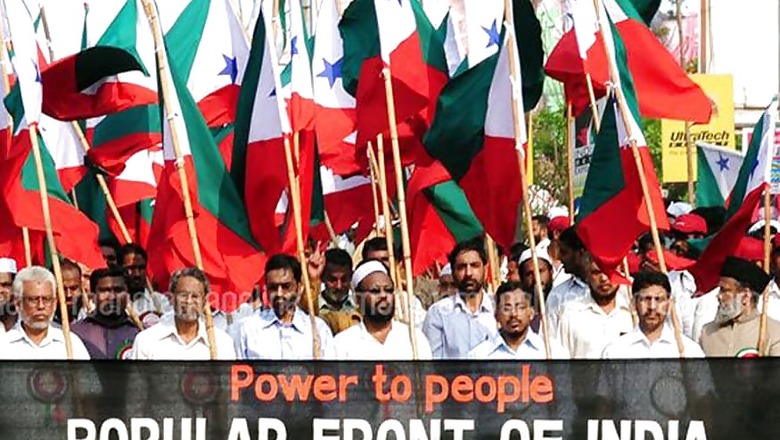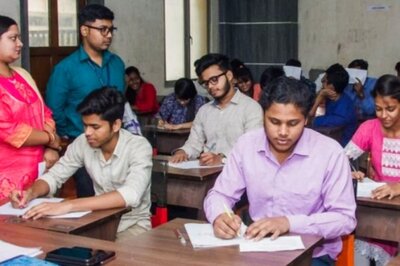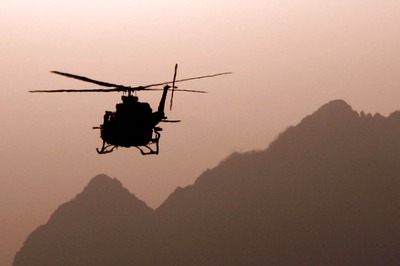
views
Uttar Pradesh police has called for a ban on the Popular Front of India (PFI) after authorities arrested 25 members of the outfit for alleged involvement in propagating riots across the state during last month’s protests against the Citizenship Amendment Act. The union ministry of home affairs (MHA) so far has not confirmed if the proposal from UP has been received. But in case the Centre decides to outlaw the alleged offshoot of Students Islamic Movement of India (SIMI) — which was designated a terrorist organisation and then banned in 2001 — there are three other dossiers pending with the MHA detailing the alleged role of PFI in anti-India activities.
In 2010, the Intelligence Bureau first created a dossier on the PFI. This recorded information (reported by CNN-News18, then CNN-IBN, in November 2010) called the extremist group “a confederation of Islamic organisations which was collaborating with the banned Islamist terrorist Students Islamic Movement of India (SIMI)”. The IB said PFI’s reach was spreading from Kerala to Rajasthan to Goa, UP, West Bengal and even the Northeast.
“Organisations like the Citizen's Forum, Goa, Community Social and Educational Society, Rajasthan, Nagrik Adhikar Suraksha Samiti, West Bengal, Liong Social Forum, Manipur and the Association of Social Justice, Andhra Pradesh were all part of PFI’s growing network,” the dossier said.
The report noted that the PFI’s presence had been noticed in about a dozen districts in eastern and western Uttar Pradesh including Muzaffarnagar and Azamgarh. “The warnings came after the recovery of a large number of objectionable posters from UP’s Barabanki and Muzaffarnagar districts a few days earlier. The posters contained an appeal to Muslims to fight the forces which were behind the blasts at Mecca Masjid, Ajmer and Malegaon,” the IB dossier said.
This was soon after TJ Joseph, a professor of Malayalam at a Christian minority institution, was attacked and his hand chopped off by alleged PFI members on July 4, 2010, in Kerala.
While the-then P Chidambaram-led union home ministry deliberated on a ban on PFI under the Unlawful Activities Prevention Act (UAPA), then home secretary GK Pillai expressed concerns over rising Islamic radicalisation in Kerala. Without explicitly naming the PFI, Pillai said in Thiruvanathpuram in September 2010: “Religious fundamentalism is a cause for concern. We should not allow it to grow it. We need to take effective steps to contain the menace. Otherwise it could pose a serious threat to Kerala's future.” The comments were made soon after discussions with Kerala chief minister VS Achuthanandan on the security situation in the state and against the backdrop of the attack on Joseph.
In 2017, calls for a ban on PFI received fresh impetus after the National Investigation Agency (NIA) submitted to the home ministry a comprehensive dossier which listed the Islamic group’s links with terror-related cases that the agency had investigated. The NIA dossier said the PFI was the second avatar of the National Development Front which was formed in 1993 after the Babri Masjid demolition and subsequent riots.
“NDF subsequently merged with MNP of Tamil Nadu, KFD of Karnataka, Citizen's Forum (Goa), Community Social and Educational Society (Rajasthan), Nagrik Adhikar Suraksha Samiti (Andhra Pradesh) etc to form PFI. Formation of PFI was first announced on 9.11.2006 in Bangalore,” the NIA dossier said.
The NIA said the PFI had now spread to Manipur, Assam, Uttar Pradesh, Delhi, Gujarat, Rajasthan, Maharashtra and West Bengal besides having a strong presence in Kerala, Karnataka and Tamil Nadu. Its leadership claims it has a presence in 23 states.
The PFI also has a political group – Social Democratic Party of India (SDPI) — which took part in panchayat elections in Kerala.
The NIA in its dossier listed the PFI and its political wing SDPI for involvement in the Rudresh murder case, Bangalore blast case, Kerala professor palm-chopping case, Hadiya case, and ISIS Omar-al-Hindi case, among others. The dossier gave full details of the organisational structure, office bearers, source of funding and terror linkages of the PFI. "The cadres are consciously encouraged to intervene and react even in minor cases against members of the Muslim community. The cadre is also encouraged to act as guardian of Islamic values, thus effectively converting them into moral police. The cadres are given training in martial arts and combat using sticks and knives/swords at some locations in their strongholds,” the NIA said. The premier terror investigation agency, however, also noted that the involvement of the PFI in law-and-order incidents showed a decline after the “determined crackdown by Kerala police” post the palm-chopping incident.
In 2018, the-then minister of state for home affairs Kiren Rijiju said the Kerala government led by chief minister Pinarayi Vijayan had sought a ban on the PFI. This was later denied by the CM.
In the absence of a decision by the home ministry, the Jharkhand government in February 2019 banned the controversial organisation for its alleged links with Islamic State (IS) under section 16 of The Indian Criminal Law Amendment Act, 1908. A previous ban by the state government had been set aside by the Jharkhand high court in August 2018.
Now, the Uttar Pradesh police in a letter to the state home department has listed PFI members from UP who have been arrested for allegedly inciting violence in Shyamali, Meerut and Deoband during the anti-CAA protests. State director general of police (DGP) OP Singh on Friday reiterated that the UP government is taking up the demand for a ban against the PFI with the MHA under relevant sections of the UAPA.


















Comments
0 comment